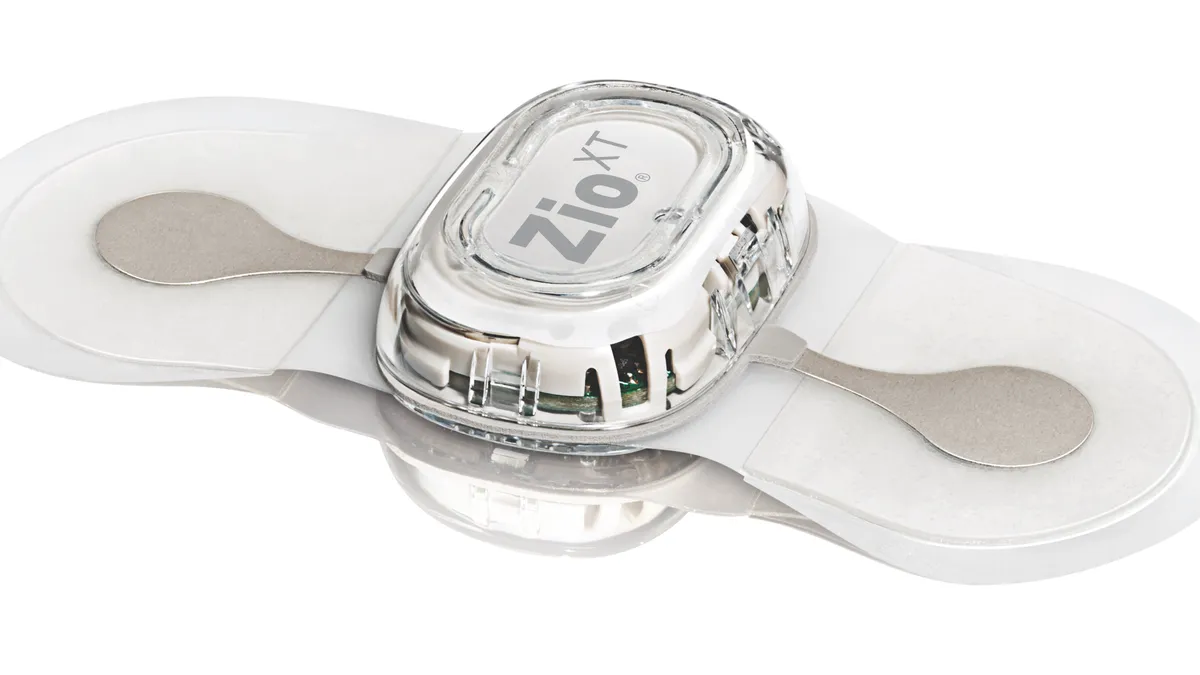Dive Brief:
- iRhythm's back-and-forth Medicare pricing saga may not be over yet. CEO Michael Coyle said Thursday that the company has met with Novitas Solutions, a Medicare Administrative Contractor (MAC), to discuss a different pricing methodology since the Medicare rate setter cut prices for long-term cardiac monitoring by roughly $200 in April.
- The CEO was optimistic that Novitas was receptive to the methodology presented by iRhythm, which Coyle contends better reflects healthcare cost savings and services like data processing through artificial intelligence algorithms. However, Coyle said that "no commitment has been made by Novitas to accept this alternative costing approach" and there is no established timetable for any possible payment update.
- Despite the $13 million first-quarter hit from the rate cut, iRhythm grew revenue year over year by 17% to $74.3 million in the quarter. Investors seemed encouraged by the updates as the company's stock price jumped by nearly 8% when the market opened Friday.
Dive Insight:
After a successful 2020 for iRhythm, where revenue increased year over year by 23.6% and its stock price more than tripled, 2021 has brought a near-constant series of challenges. Novitas first cut rates for long-term cardiac monitoring — iRhythm's primary revenue source — from about $311 to the $40-50 range in January, before ultimately setting rates at about $115 in April.
The roughly $200 payment cut was a blow to a company and broader long-term cardiac monitoring market that Wall Street analysts were consistently bullish on behind a growing increase in the use of wearables and a fairly untapped patient population.
The series of pricing changes fueled a 72% drop in the company's stock price since late January, erasing nearly all of 2020's gains.
When the $115 rate was published in April, Coyle said that the company could no longer offer long-term monitoring services through the Medicare fee-for-service program because the rates no longer covered costs. However, after meeting with Novitas since the April rate change, the CEO said Thursday that iRhythm reversed this decision until there is more clarity from Novitas and other avenues are pursued.
While Novitas processes iRhythm's long-term cardiac monitoring claims and the majority of all long-term claims, iRhythm can move to a new MAC that covers a different region of the U.S. However, there are no guarantees another MAC would offer meaningfully different rates than Novitas.
The other option would be to get a national pricing determination from CMS in the 2022 Physician Fee Schedule, which Coyle said is the company's ultimate goal. This option, however, is also not guaranteed as CMS passed on this decision in December and could use Novitas rates as a guide to set their own.
Coyle said that iRhythm met with CMS in mid-March and the company will "aggressively continue to pursue national pricing."
Wall Street analysts were mixed in their reactions to the company's Novitas updates.
J.P. Morgan was optimistic that, eventually, Medicare rates would be upped by Novitas, through another MAC or through CMS in a national pricing determination. William Blair wrote that the meeting with Novitas "is an improvement over the limited dialogue earlier this year and indicates some urgency and consideration around the potential for another change to rates."
However, analysts from both J.P. Morgan and William Blair noted there is still significant pricing uncertainty in the near term.
Baird analyst Mike Polark was less optimistic on an eventual rate change, writing that the "data that we can see and the history we can read about just does not support belief in good odds of a materially different outcome."
Coyle said that the pricing change did not impact product volumes in the quarter and the majority of contracts with commercial payers have been negotiated at similar levels to past rates. iRhythm projects a 4% volume increase in the second quarter over the first quarter of 2021.
William Blair analysts wrote that the volume gains are encouraging as the "company is clearly making progress converting the market to its extended wear [EKG] patch despite noise around reimbursement."
While iRhythm's revenues grew by mid-double digits in the first quarter, net losses for the quarter totaled $27.8 million, compared to a net loss of $9.1 million in the first quarter of 2020.












